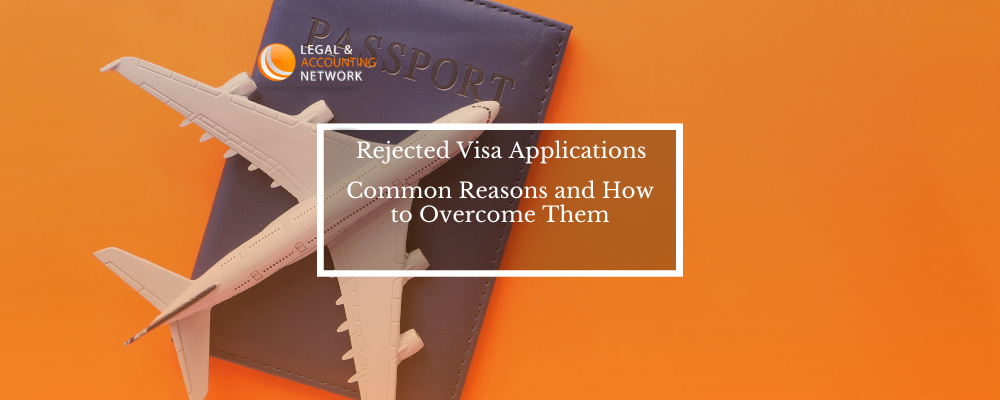Rejected visa applications can be a frustrating experience when planning your travels. Understanding the common reasons for visa denials and how to improve your application can increase your chances of success. It is crucial to be well-informed about visa requirements, provide accurate documentation, and establish strong ties to your home country. Seeking assistance from official authorities and utilizing consular services can also be beneficial. Exploring alternative travel options, such as Schengen visa alternatives or visa-free travel for selected countries, may be worth considering. Here, we address frequently asked questions and dispel concerns or misconceptions.
Reasons for Rejected Visa Applications
Understanding the reasons behind rejected visa applications is crucial to improve your chances of obtaining a visa successfully. This section explores common factors that can lead to visa denial and discusses a specific scenario related to international parental child abduction affecting visa applications.
Common Reasons for Visa Denial
Visa denial can occur due to various reasons, which applicants must be aware of to avoid pitfalls in their application process. Some common reasons for visa denial include:
- Incomplete or inaccurate documentation: Failing to provide all required documents or submitting incomplete or incorrect information can lead to visa rejection. It is essential to carefully review the visa application requirements and ensure all necessary supporting documents are included.
- Lack of proof of strong ties to your home country: Visa authorities aim to ensure that applicants have compelling reasons to return to their home country after their temporary stay. Failure to demonstrate strong ties, such as employment, property ownership, or family connections, might result in visa denial.
- Inadequate financial resources: Inability to demonstrate sufficient financial means to support oneself during the planned stay in the destination country can lead to visa rejection. This includes showing proof of funds to cover accommodation, transportation, and daily expenses.
- Prior immigration or visa violations: Previous violations, such as overstaying a visa or engaging in unauthorized work, can impact future visa applications. These actions raise red flags and can result in visa denial.
- Lack of travel insurance: Some countries require applicants to have travel insurance that covers medical expenses and emergencies during their stay. Failing to provide proof of adequate travel insurance can lead to visa rejection.
International Parental Child Abduction and Visa Denial
Another specific situation related to visa denial is international parental child abduction cases. In such instances, visa applications may be rejected to prevent one parent from removing a child from the country without the consent of the other parent or legal authorities.
International parental child abduction is a serious issue that can cause emotional distress and legal complications. Visa authorities take measures to protect the rights and well-being of children involved in such cases.
It is important for individuals facing visa denial due to international parental child abduction issues to consult legal experts and explore legal channels to resolve these matters appropriately.
How to Improve Your Visa Application
When it comes to improving your visa application, there are several key factors to consider. Understanding the specific requirements and necessary documentation is crucial for a successful application process.
Understanding Visa Requirements and Documentation
Before submitting your visa application, thoroughly research the requirements for your desired destination. Each country has its own specific criteria and supporting documents that must be provided. This may include proof of financial stability, travel medical insurance, flight itineraries, and accommodation bookings.
Ensure that all documents are accurate, up-to-date, and presented in the required format. Any inconsistencies or missing information can lead to your application being denied. Consulting with the official embassy or consulate can provide further guidance on the specific requirements for your chosen destination.
Tips for a Successful Visa Interview
The visa interview is a crucial step in the application process. Be prepared by reviewing common interview questions and practicing your responses. Be concise, honest, and confident in your answers.
Dress professionally and arrive on time for your interview. Bring all necessary documents along with additional copies, as requested. Maintain a positive attitude and demonstrate your genuine reasons for wanting to travel.
It is important to note that while the interview is an essential component, a strong application is built upon thorough preparation and accurate documentation.
Ensuring Strong Ties to Your Home Country
One way to strengthen your visa application is by demonstrating strong ties to your home country. This can include providing evidence of stable employment, property ownership, family relationships, or educational commitments. The goal is to convince the immigration authorities that you have legitimate reasons to return to your home country after your intended stay.
Highlighting your connections and responsibilities in your home country can alleviate concerns about potential immigration intentions. Including supporting documents such as employment contracts, property deeds, or bank statements can provide credibility to your application.
Remember, each country has its own specific requirements and expectations, so it is crucial to familiarize yourself with these guidelines and tailor your application accordingly.
Seeking Assistance and Support
When facing a rejected visa application, it is crucial to seek assistance and support to explore potential solutions for overcoming the denial. Here are two avenues to consider:
Contacting Official Authorities
Reaching out to official authorities can provide valuable guidance and clarification regarding the visa application process. These authorities can offer insights into specific visa requirements, documentation, and any recent changes in policies.
Embassies or consulates of the country you applied to can provide detailed information about the reasons for denial, the possibility of appeal or reapplication, and any additional steps that may be required. They can also guide you through the appeal process and provide assistance in understanding the necessary documentation.
It is important to approach the official authorities politely and professionally. Clearly explain your situation, express your willingness to comply with all requirements, and seek advice on how to improve your chances of a successful visa application in the future.
Utilizing Consular Services for Visa Guidance
Consular services can be an invaluable resource for visa-related assistance. Consulates often provide specific services to help applicants with visa guidance and support.
Consular officers can offer personalized advice based on your individual circumstances. They can provide insights into common reasons for visa denials and suggest appropriate actions that can enhance your application. Their expertise can prove crucial in addressing concerns related to visa eligibility, documentation, and interview preparation.
It is advisable to schedule an appointment with the consular office, either in person or through their online booking system, to discuss your visa application. Prepare a list of questions beforehand to ensure you cover all your concerns, and take notes during the meeting to keep track of the information provided.
Remember, consular officers are there to assist and guide applicants, so approach them respectfully and seek their expertise in navigating the visa application process.
Exploring Alternative Travel Options
When facing a rejected visa application, it’s crucial to explore alternative travel options that might still allow you to reach your desired destination. Here are a couple of alternatives that you can consider:
Schengen Visa Alternatives
If your visa application for the Schengen area has been rejected, don’t lose hope. There are several alternatives you can explore:
- Apply for a visa to a different Schengen country: If your initial choice of country has a high rejection rate, consider applying to another Schengen country with a lower rejection rate. Research the visa requirements and regulations of that country before submitting your application.
- Explore visa waiver programs: Some countries outside the Schengen area offer visa-free travel or visa-on-arrival options for certain nationalities. Check if your nationality falls under any of these programs, as it can be an excellent alternative to a Schengen visa.
- Consider transit visas: If you only need to transit through the Schengen area on your way to another destination, you may be eligible for a transit visa. Familiarize yourself with the transit visa regulations and requirements of the specific Schengen country you will be transiting through.
Visa-Free Travel for Selected Countries
Another alternative to consider is exploring countries that offer visa-free travel for your nationality. These countries allow you to visit for a specified period without the need for a visa. Some countries offer visa exemptions for tourism, business, or cultural exchanges.
- Research visa-free countries: Look for countries that allow visa-free travel for your nationality and find out the specific requirements and conditions for entry. Some countries may have certain limitations on the duration of stay or purpose of visit.
- Plan your itinerary: Once you have identified countries that offer visa-free travel, plan your itinerary accordingly. Make sure to adhere to the allowed duration of stay and any additional entry requirements such as proof of accommodation or return ticket.
- Consult with official authorities: Reach out to the consulates or embassies of the visa-free countries you plan to visit to get the latest information and clarify any doubts or concerns you may have.
Exploring alternative travel options can open up new possibilities for you, even if your visa application has been rejected. By considering different countries and visa options, you can still embark on your desired journey. Remember to thoroughly research the requirements and regulations of each alternative before proceeding with your travel plans.
Frequently Asked Questions
Common Questions About Visa Applications
Here are some commonly asked questions regarding visa applications:
- What are the most common reasons for visa denial?
- How can I avoid having my visa application rejected?
- What documents are typically required for a visa application?
- How long does it take to process a visa application?
- Can I apply for a visa if I have a criminal record?
- What should I do if my visa application is rejected?
Understanding the answers to these questions can help you navigate the visa application process more effectively and increase your chances of a successful outcome.
Addressing Concerns and Misconceptions
There are often concerns and misconceptions surrounding visa applications. Let’s address some of them:
Misconception: Visa applications are always rejected without proper reasons.
Reality: While visa applications can be rejected, authorities typically provide reasons for the denial. It’s crucial to review the specific grounds for rejection and seek guidance or assistance to address any deficiencies in your application.
Concern: A previous visa rejection means future applications will also be rejected.
Reality: While a previous visa rejection can impact future applications, it doesn’t guarantee rejection. By understanding the reasons for the previous denial and making necessary improvements, you can increase your chances of success with future applications.
Concern: Providing more documents and information than required will guarantee visa approval.
Reality: While it’s important to provide accurate and adequate documentation, overwhelming authorities with unnecessary information can be counterproductive. Focus on providing relevant supporting documents that meet the visa requirements.
Concern: The visa interview is the sole determining factor for approval or denial.
Reality: The visa interview plays a crucial role in the decision-making process, but it’s not the sole determinant. The overall strength of your application, including the supporting documentation and demonstration of strong ties to your home country, also significantly impacts the final decision.
By addressing these concerns and understanding the realities of the visa application process, you can approach your application with clarity and confidence.







